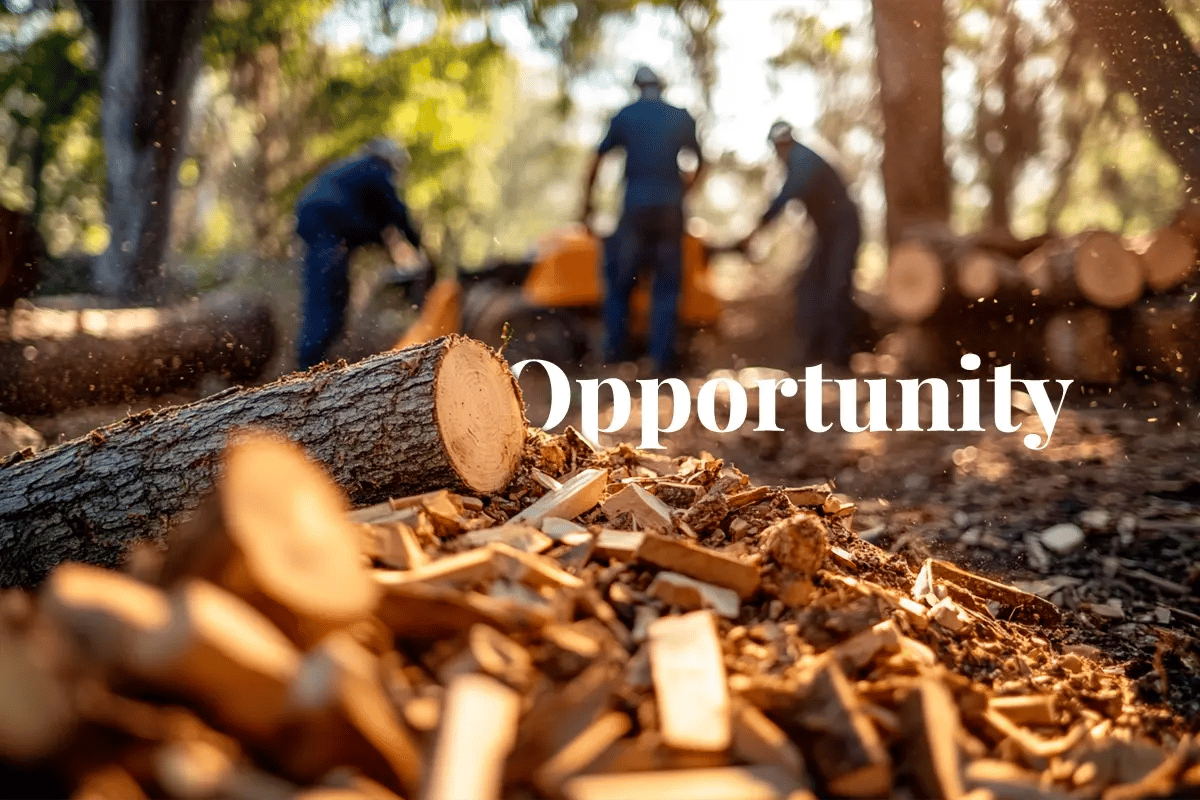Integrating carbon pricing into biomass value chains could offer a financial boost to efforts aimed at clearing invasive alien trees, a new report suggests. Published by the Commonwealth Forestry Association, the study explores how carbon incentives could strengthen the economic case for eradicating invasive species in South Africa—while simultaneously supporting renewable energy goals.
 Close-up of biomass from invasive trees, with logs and wood chips in the foreground and workers in a South African forest in the background. AI generated picture.
Close-up of biomass from invasive trees, with logs and wood chips in the foreground and workers in a South African forest in the background. AI generated picture.
Invasive alien trees pose a persistent environmental and socio-economic challenge, and current resources have proven inadequate to address their spread. The report evaluates how carbon finance might help close that gap by assessing the potential of biomass derived from cleared invasive trees to earn carbon credits.
‘We find that eligibility depends on standards as their approach and criteria differ, yet the trend is supportive’, the report notes. It adds that some standards are already recognising the environmental liability posed by invasive species and are issuing credits, provided the clearing process is sustainable.
The study assessed biomass supply to three distinct value chains: biochar, charcoal for household stoves, and wood chips for steam energy. Among these, biochar stands out for its potential to generate high-value carbon credits tied to carbon dioxide removal.
Read more: Why carbon credits are a smarter investment than Bitcoin
‘Biochar… could ensure profitability even with very low biochar market prices, which is possibly a game changer to support biochar production in a context where willingness to pay by farmers/users remains low’, the authors said.
The potential economic uplift from carbon incentives is significant, according to the report. In some cases, carbon pricing could cover up to 20% of the final product value. That could translate into an increase of 8%–95% in the maximum affordable cost of biomass supply, depending on the assumptions used, such as carbon credit prices and specific value chains.
Beyond economic viability, the report suggests this approach could help reduce reliance on fossil fuels. By transforming biomass from invasive trees into renewable energy sources like biochar and bioenergy, South Africa could make progress toward its commitments under the Paris Agreement.
‘This would provide the means to supply biomass at scale and sustain both an energy transition and the large-scale production of biochar while leading to an eligibility of associated value chains to issue carbon credits’, the study concluded.
Read more: Airlines need up to 150 million carbon credits by 2026
As markets explore innovative ways to turn environmental liabilities into environmental solutions, biomass from invasive trees is gaining traction—especially when paired with carbon credits that reward ecological restoration. This shift mirrors a broader demand for high-integrity, nature-based carbon units—exactly the kind DGB Group specialises in. Our large-scale projects don’t just remove carbon; they restore ecosystems, support communities, and unlock new value from nature’s potential. As global industries seek sustainable, verifiable offsets, now is the time to discover how investing in premium carbon units can deliver both impact and opportunity.




